Meg Danforth, Colleen E. Carney – 3-Day Intensive Training: Cognitive Behavioral Therapy for Insomnia (CBT-I): Evidence-based Insomnia Interventions for Trauma, Anxiety, Depression, Chronic Pain, TBI, Sleep Apnea and Nightmares
$599.99 Original price was: $599.99.$119.00Current price is: $119.00.
[Instant Download] – You will receive instant download access after the purchase
- Faculty:
- Meg Danforth | Colleen E. Carney
- Duration:
- 18 Hours 54 Minutes
- Format:
- Audio and Video
- Copyright:
- Mar 14, 2018
Description
| Manual (9.2 MB) | 110 Pages | Available after Purchase | |
| Extra Handout (2.22 MB) | 23 Pages | Available after Purchase | |
| Day 1 B/W slides (5.69 MB) | 95 Pages | Available after Purchase | |
| Day 2 B/W slides (4.40 MB) | 73 Pages | Available after Purchase | |
| Day 3 B/W slides (11.63 MB) | 102 Pages | Available after Purchase |
Outline
- DAY 1: Assessment and the Basics of CBT-I
- Assessment
- Goals of assessment
- Clinical tools for assessing insomnia
- Screen for other sleep disorders
- When to make a referral to a sleep clinic
- Contraindications for CBT-I
- Sleep and its Regulation
- Normal sleep architecture
- Two-process model of sleep: Circadian rhythm and sleep drive
- The arousal system
- What causes chronic insomnia?
- Key perpetuating factors for chronic insomnia
- Behaviors that interfere with “buildup” of sleep drive
- Behaviors that interfere with the optimal timing of sleep
- Conditioned arousal and physiological/ cognitive hyperarousal
- Perpetuating factors and CBT-I
- Step-by-Step Guide to CBT-I: Stimulus Control and Sleep Restriction Therapies
- Stimulus Control (SC): Addressing conditioned arousal
- Rules for re-associating the bed with sleep
- Identify and overcome potential obstacles to adherence
- Sleep Restriction Therapy (SRT): Restoring the sleep drive
- How to present rationale
- Calculate time-in-bed prescription
- Placing the time-in-bed window
- Identify and overcome potential obstacles to adherence
- Sleep extension
- Combining SC and SRT
- The myth of sleep hygiene
- Stimulus Control (SC): Addressing conditioned arousal
- Step-by-Step Guide to CBT-I: Cognitive Therapy and Counter-arousal
- Counter-arousal strategies: Quieting an active mind
- Establishing a buffer zone
- Processing strategies (including constructive worry and rumination strategies)
- Mindfulness and relaxation therapies
- Cognitive therapy: Identify and change distorted thoughts about sleep
- Thought Records
- Behavioral Experiments
- Socratic Questioning
- Counter-arousal strategies: Quieting an active mind
- Implementation Issues
- Models of Delivery
- Four session individual therapy format
- Seven session group therapy format
- Single session CBT-I
- CBT-I and hypnotic medication
- Practice guidelines: CBT-I as first line treatment for chronic insomnia
- Combining CBT-I with sleep medication
- Positive and negative effects of sleep medications
- Use of ineffective sleep medications
- Promote non-contingent use of sleep medication
- Strategies to support hypnotic discontinuation
- Models of Delivery
- Assessment
- DAY 2: Delivering CBT-I in the Context of Comorbidities
- Depression
- CBT-I and MDD
- Troubleshooting adherence in depressed patients
- Anhedonia
- Sleep or bed as avoidance
- Fatigue and fatigue management strategies
- Rumination in depression
- Case examples
- Sleep and antidepressants
- Anxiety
- Sleep effort: Core target of CBT-I
- Covert manifestations of sleep effort
- Cognitive restructuring of sleep anxiety
- Paradoxical Intention
- Troubleshooting adherence with anxious clients
- When SRT/SC increase anxiety
- Counter control and sleep compression
- High sleep anxiety vs high arousal
- Panic Disorder and nocturnal panic
- OCD and CBT-I
- Sleep effort: Core target of CBT-I
- Trauma
- Sleep and PTSD
- CBT-I trials in PTSD
- Behavioral targets in clients with insomnia vs PTSD
- Common treatment challenges in clients with PTSD
- Nightmares and nightmare treatments
- Traumatic Brain Injury (TBI)
- Comorbid TBI
- Sleep and TBI
- Efficacy of CBT-I in mild TBI (mTBI)
- Modify insomnia treatment for mTBI
- Comorbid TBI
- Chronic Pain
- Efficacy of CBT-I for those with chronic pain
- Chronic pain and stimulus control
- Common treatment challenges in clients with chronic pain
- Pain medications and other considerations
- Hypnotic Discontinuation
- Combined guided hypnotic taper approach
- Factors sustaining hypnotic dependence
- Unhelpful beliefs
- Learning
- Strategies to support client during hypnotic taper
- Psychoeducation about psychological dependence and rebound insomnia
- Cognitive therapy to target unhelpful beliefs
- Sample taper schedules
- Depression
- DAY 3: Co-Occurring Sleep Disorders and Advanced Case Formulation
- Co-Occurring Sleep Apnea
- Obstructive sleep apnea (OSA)
- Morbidity and mortality of OSA
- Relationship of nocturia and OSA
- Sleep apnea treatments
- Obstacles to treatment adherence
- Physical comfort
- Mechanical problems
- Social and other factors
- Psychological factors
- Improve adherence
- Work with stages of change
- Respond to common concerns
- CPAP desensitization for claustrophobia
- Treating insomnia in patients with comorbid OSA
- Obstructive sleep apnea (OSA)
- Circadian Rhythm Sleep Disorders
- Using light to leverage circadian timekeeper
- “Exogenous” circadian challenges
- Cope with shift work
- Adjust to jet lag
- “Endogenous” circadian disorders: Advanced and delayed sleep phase
- Phototherapy for delayed sleep phase
- Imagery Rehearsal Therapy for Nightmares
- Nightmares and nightmare disorder
- Differential diagnosis
- Assessment
- Self-monitoring via nightmare log
- Combine nightmare log and sleep diary
- Imagery Rescripting and Rehearsal
- Psychoeducation and rationale
- Nightmares and trauma
- Shaping imagery skills
- IRT steps
- Prazosin for nightmares
- Nightmares and nightmare disorder
- Advanced Case Formulation in CBT-I
- Case conceptualization: Asking the right questions
- Case Formulation Form
- Factors weakening sleep drive
- Factors weakening the clock
- Evidence of hyperarousal
- Unhelpful sleep behaviors
- Comorbidities
- Case Examples
- Co-Occurring Sleep Apnea
Faculty
Meg Danforth, Ph.D., CBSM Related seminars and products: 3
Meg Danforth, Ph.D., CBSM, is a licensed psychologist and certified behavioral sleep medicine specialist who provides advanced clinical care to patients with sleep disorders and comorbid medical and mental health issues. She is a clinician and educator at Duke University Medical Center in Durham, NC. As the Director of the Duke Behavioral Sleep Medicine Clinic, she has been helping people sleep better without medication for the past 15 years. She also provides clinical training and supervision to psychology graduate students, interns, and fellows. Dr. Danforth is committed to teaching clinicians from a variety of backgrounds to deliver CBT-I in the settings in which they practice. Her work has been featured in the Associated Press and CBS News.
Speaker Disclosures:
Financial: Margaret Marion Danforth is a clinical associate at Duke University Medical Center. She receives a speaking honorarium from PESI, Inc.
Non-financial: Margaret Marion Danforth is a member of the Association for Behavioral and Cognitive Therapies.
Colleen E. Carney, Ph.D. Related seminars and products: 5
Colleen E. Carney, Ph.D., is on faculty in the Department of Psychology at Ryerson University, where she is director of the Sleep and Depression Laboratory. She is a leading expert in psychological treatments for insomnia, particularly in the context of co-occurring mental health issues. Her work has been featured in The New York Times and she has over 100 publications on insomnia.
She frequently trains students and mental health providers in CBT for Insomnia at invited workshops throughout North America and at international conferences. Dr. Carney is a passionate advocate for improving the availability of treatment for those with insomnia and other health problems. For more information, please visit www.drcolleencarney.com.
Speaker Disclosure:
Financial: Colleen Carney is a professor at Ryerson University. She receives a speaking honorarium from PESI, Inc.
Non-financial: Colleen Carney is a member of the Canadian Psychological Association; and the Association for Behavioural and Cognitive Therapies (ABCT).
Delivery Method
– After your purchase, you’ll see a View your orders link which goes to the Downloads page. Here, you can download all the files associated with your order.
– Downloads are available once your payment is confirmed, we’ll also send you a download notification email separate from any transaction notification emails you receive from IMC.sale.
– Since it is a digital copy, our suggestion is to download and save it to your hard drive. In case the link is broken for any reason, please contact us and we will resend the new download link.
– If you cannot find the download link, please don’t worry about that. We will update and notify you as soon as possible at 8:00 AM – 8:00 PM (UTC+8).
Thank You For Shopping With Us!
Be the first to review “Meg Danforth, Colleen E. Carney – 3-Day Intensive Training: Cognitive Behavioral Therapy for Insomnia (CBT-I): Evidence-based Insomnia Interventions for Trauma, Anxiety, Depression, Chronic Pain, TBI, Sleep Apnea and Nightmares” Cancel reply
Related Products
Medical & Health
Medical & Health
Medical & Health
Psychology & Body Language
Tobias Atkins – How to beat anxiety, depression, and panic attacks naturally
Spirituality & Religion

![[Audio Download] EP13 Workshop 37 - Reality is Negotiable: Absorbing People in Positive Possibilities - Michael D. Yapko](https://imc.sale/wp-content/uploads/2022/02/Audio-Only-EP13-Workshop-37-Reality-is-Negotiabl-Absorbing-People-in-Positive-Possibilities-Michael-D.-Yapko-PHD-100x100.png)
![[Audio Download] BT12 Workshop 17 - Advanced Techniques of Therapy II: Creating Emotional Impact - Jeffrey Zeig](https://imc.sale/wp-content/uploads/2022/02/Audio-Only-BT12-Workshop-17-Advanced-Techniques-of-Therapy-II-Creating-Emotional-Impact-Jeffrey-Zeig-PhD-100x100.png)
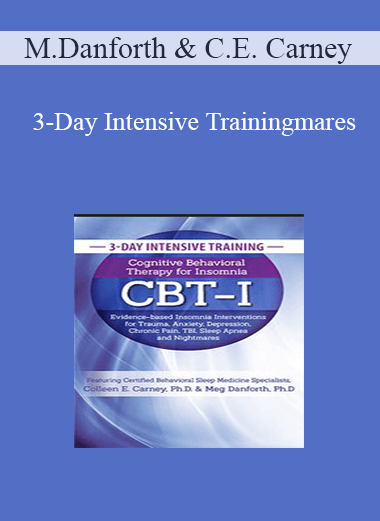

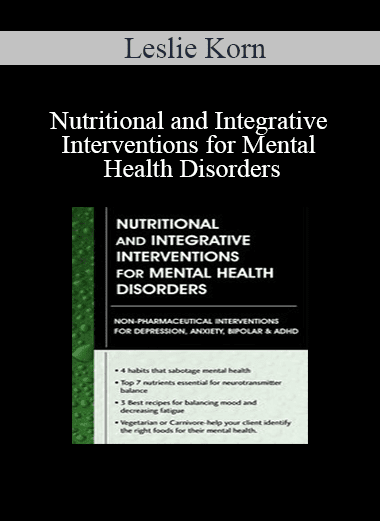
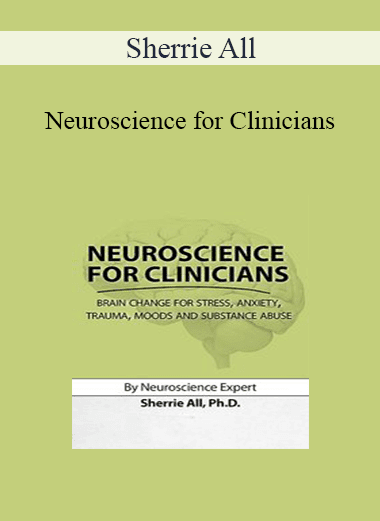
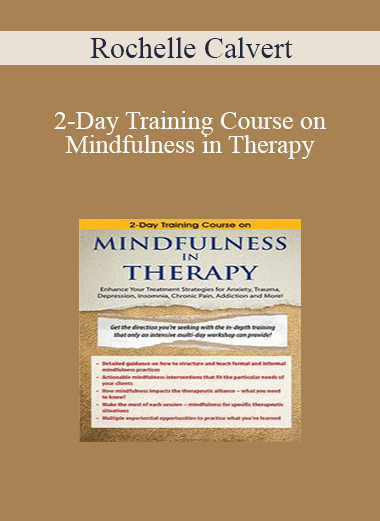
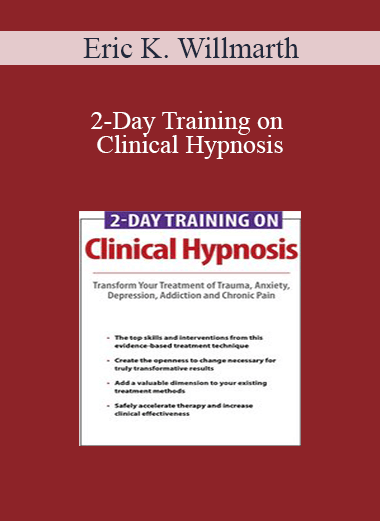
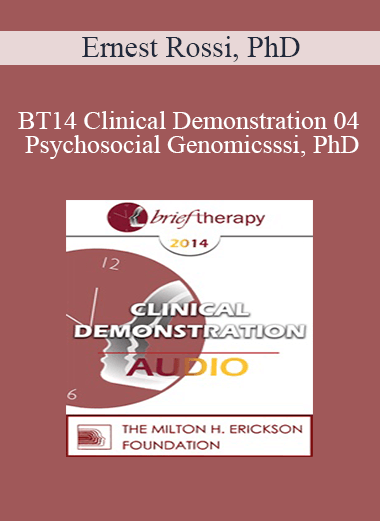

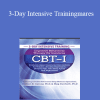
9 reviews for Meg Danforth, Colleen E. Carney – 3-Day Intensive Training: Cognitive Behavioral Therapy for Insomnia (CBT-I): Evidence-based Insomnia Interventions for Trauma, Anxiety, Depression, Chronic Pain, TBI, Sleep Apnea and Nightmares
There are no reviews yet.